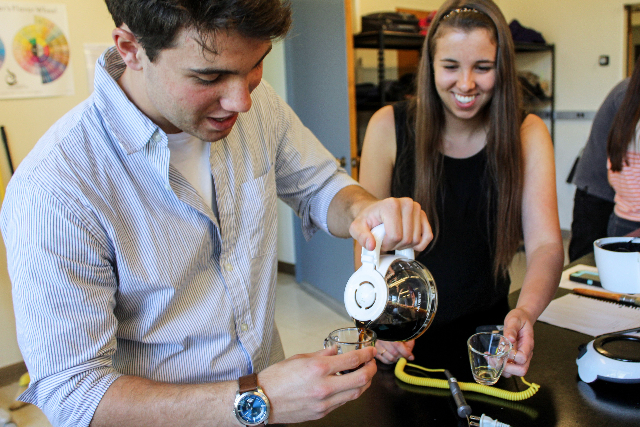During Winter Quarter 2014, UC Davis offered its first coffee course to students. Students could enroll in ECM 1: The Design of Coffee, taught by Professor William Ristenpart of the Chemical Engineering Department.
According to ECM 1 teaching assistant (TA) Jerry Sanborn, the class allowed students to breach out from the more typical college classes and subjects.
“The course offers students a chance to explore into numerous avenues beyond a student’s areas of study,” Sanborn said. “Coffee is a big topic, so I’m not sure how a major would work, but studying it engages people from separate backgrounds and provides a full-rounded educational experience.”
The steady increase in coffee consumption could explain the need for further research and study. Sanborn attributed the class’ popularity to the broad appeal of coffee.
“More industrialization has led to more coffee makers,” Sanborn said.
Tom Whim, one of the other TAs of the class, previously taught other chemical engineering classes, and he thinks that ECM 1 offers students a positive introduction to chemical engineering.
“I think it’s great for students to get a taste of chemical engineering early on in their career,” Whim said. “Every college student needs to drink some caffeine.”
In the class, students have a hands-on experience making coffee. Their experiments involve measuring temperature, recording observations, finding ingredient ratios and tasting the final product. Students are able to see which types of mixtures are effective and which are unsuccessful.
Corey Ching, a second-year computer science major, was interested in the course because it seemed fun, fairly simple and relevant.
“I definitely feel like a lot of people would be interested in a coffee emphasis, particularly people who wanted something specific because sometimes majors are very broad in terms of what you want to do,” Ching said. “The engineering of coffee is relative to a lot of our lives. It gets people interested and thinking about what’s behind a lot of the process.”
Ching said that he would like to see more in-depth coffee courses offered.
“It would be interesting to see if these types of classes could move things forward,” Ching said. “I know this is just an introduction to the design of coffee, but if it would get into more like the scientific aspect of the perfection of brewing, that would change my decision on taking more courses.”
According to Ristenpart, no further coffee courses have been designed yet, and there is no timeline for UC Davis to offer a coffee major.
“Nothing has officially been proposed yet, we are just in the exploratory stages for now, but there has been a tremendous amount of interest [regarding the major],” Ristenpart said. “Students won’t be able to sign up for a coffee major anytime soon, but as a starting point, they can all sign up for ECM 1.”
Ristenpart said that further investigation behind the science of coffee would benefit both the coffee industry and academia.
“It would be a tremendous resource for the coffee industry,” he said. “Up until now, coffee has not formally been represented in academia at all.”
Although prospective study behind the science of coffee remains a work in progress, exploring such a topic is a step towards creating and sustaining an even more diverse university.
“I think students drink a lot of coffee, but know nothing about it,” Ristenpart said. “Last quarter we had students that didn’t even know that coffee grew on trees or that it was green before you roasted it. Studying coffee involves several disciplinary fields, such as food chemistry and learning about dairy physics. There is a lot of enthusiasm for coffee, but very little knowledge.”
JASMINE MANGABAY can be reached at campus@theaggie.org.
Photo by Jennifer Wu.





